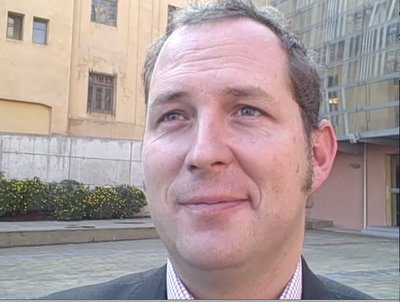
This blog entry was made earlier in Spanish. Several people have asked for an English version.
Jorge Domínguez, general manager and co-founder
A chain of websites called Diarios Ciudadanos (Citizen Dailies) in Chile is taking advantage of user-generated content to provide an alternative to crime and celebrity news.
The news sites span the country and cover topics neglected by the mainstream media, such as technology, social issues and local politics.
On a recent day, the stories on the main page were about indigenous groups observing the winter solstice, the dislocation of street merchants in the city of La Serena, and how authorities in Los Ríos are taking care of the homeless this winter.
The sites have taken to task national authorities for paying more attention to World Cup soccer than helping people in the wake of the recent devastating earthquake.
Journalists supplemented by volunteers
Four or five professional journalists staff each of the 13 sites and receive assistance from volunteers numbering in the hundreds. The sites register 2 million visits a month.
General manager and co-founder Jorge Domínguez said that the not-for-profit will add three cities and should be in the black this year. The organization has 60 employees, most of them journalists. The organization has only $20,000 in debt.
Unique way of generating revenue
Domínguez and two partners started the chain five years ago with $40,000 in personal funds and loans. They have built out the sites gradually, adding cities as they generate more revenue.
Half of the $2 million they expect to generate this year will come from developing interactive websites for businesses and organizations. For example, a brewer is sponsoring a section that covers amateur football teams. In the U.S. we would call it contract publishing.
Forty percent of the revenue will come from advertising, much of it generated from small businesses located in each of the cities in the group.
Training services generate the remaining 10 percent. Diarios Ciudadanos has lined up sponsors to pay for internet training of people who wouldn´t otherwise have access to the technology.
Social activism
Domínguez began his career as a social activist for organizations such as "Wake up, Chile" (Atina Chile). On a visit to South Korea in 2003, he learned about the citizen journalism site OhMyNews, which has a global reach and some 200,000 contributors. The model inspired him to start Diarios Ciudadanos, using citizen contributors to provide hyperlocal news.
As in many Latin American countries, the media are concentrated in the capital, and coverage of the provinces is skimpy. These news sites provide an important local service, Domínguez says.
Domínguez offers six pieces of advice for journalists wanting to undertake a project like his:
-- Don´t do the obvious. Break the rules. -- Persevere. Try again. -- Learn and listen every day. -- Be resilient, flexible, open to change. -- Be creative. -- If you serve people, the money will come